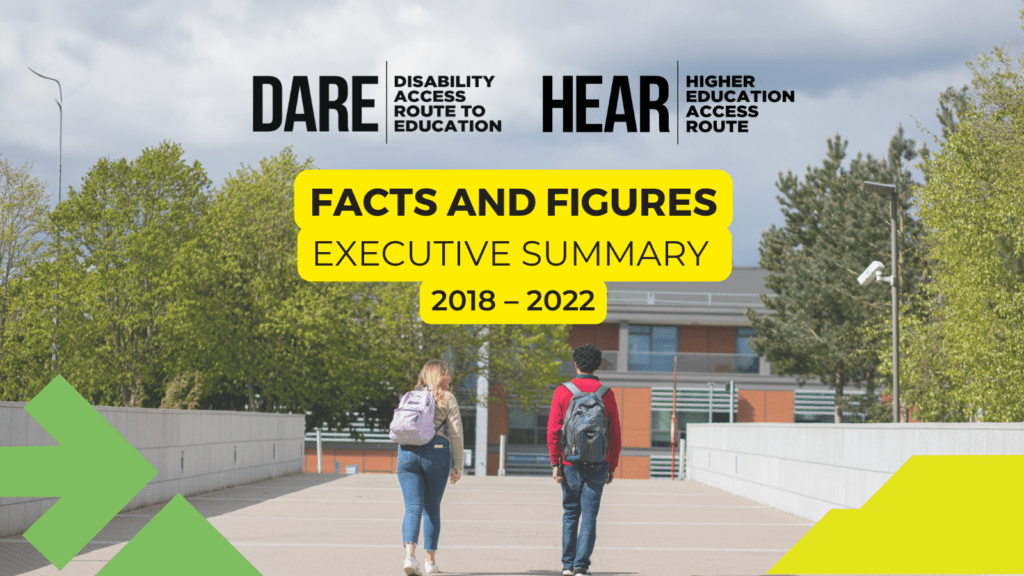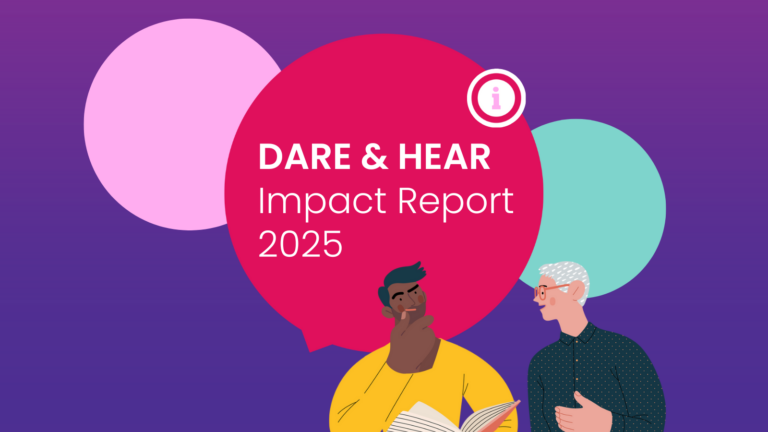
On Wednesday, the 26th of July we launched the DARE HEAR By Numbers 2018 – 2022 Research Report. This work was researched by Dr Abdellatif Atif and explored the admissions data trends during and leading up to the pandemic era on the DARE and HEAR Schemes. The report illustrated that during this period overall CAO applications increased by 7.3%, from 72,643 in 2018 to 78,012 in 2022. Trends in growth are continued for the DARE scheme as DARE applications increased from 9% (6,584) to 11% (8,731) of total CAO applications from 2018 to 2022. Downward trends for engagement dominate the HEAR scheme as applications declined by 11.3% from 8,518 (12% of total CAO applications) in 2018 to 7,548 (10% of total CAO applications) in 2022. Please see the recorded webinar video below:
The DARE scheme is successful at representing the growing number of students with disabilities in their progression to higher education yet the HEAR scheme is not fully capturing disadvantaged students on their route to higher education. Despite advancements in access to higher education being made within the last decade in Ireland, the data revealed disadvantaged students still face issues of application efficacy when it comes to supplying the correct documentation and completing applications to the HEAR scheme.
Despite this, the HEAR scheme has made gains in ensuring that the care of the state and dual-eligible (both HEAR and DARE) students are prioritised in their progression to higher education. This illustrates how the DARE and HEAR schemes can better accommodate National Access Plan 2022 – 2028 target groups once specific measures are placed via these alternative entry routes. It shows how equipped these schemes are for scaling to include new and emerging groups once we ensure they can be captured within the CAO admissions processes.
We are committed to continuing our success with the DARE and HEAR scheme for the next generation of access students. In conjunction with the DARE HEAR Facts and Figures Research, we have undertaken a HEAR Criteria Review. This review explored better ways to capture National Access Plan 2022 – 2028 target groups within our HEAR criteria, we have devised a new set of criteria which could help include Traveller/Roma, Homeless and Student-Parent applicants within our scheme. The aim is to prioritise these applicants within the scheme for offers via the CAO. These changes will come into effect for the 2026 admissions cycle, with these changes we will have supports in place such as new booklets, training and information events for stakeholders which discuss changes to the scheme and new booklets for students.
We are committed to continuing our success with the DARE and HEAR scheme for the next generation of access students. In conjunction with the DARE HEAR Facts and Figures Research, we have undertaken a HEAR Criteria Review. This review explored better ways to capture National Access Plan 2022 – 2028 target groups within our HEAR criteria, we have devised a new set of criteria which could help include Traveller/Roma, Homeless and Student-Parent applicants within our scheme. The aim is to prioritise these applicants within the scheme for offers via the CAO. These changes will come into effect for the 2026 admissions cycle, with these changes we will have supports in place such as new booklets, training and information events for stakeholders which discuss changes to the scheme and new booklets for students.
If you are a policy maker, educational researcher or practitioner, please contact Daniel McFarlane, the Irish Universities Association Access Manager regarding our published report. We are open to visiting your organisation to present our findings. See HERE to read our full Executive Summary.



